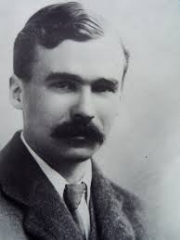George Butterworth
George Sainton Kaye Butterworth was the son of Julia Marguerite Wigan, a coloratura soprano, and Alexander Kaye Butterworth, a solicitor and general manager of Britain’s North Eastern Railway. Born in Paddington, as the couple’s only child, George soon moved with his family to York through his father’s work.
Butterworth took music lessons from Christian Padel, a local Leipzig-trained pianist, and by the time he entered the nearby Aysgarth Preparatory School he was a capable keyboard player and began to study the organ. In 1899, he entered Eton College on a scholarship and began to conduct his own compositions and give piano recitals.In 1904, George Butterworth won a place at Trinity College, Oxford to read Classics.There, his increasing musical interests as a composer, pianist, singer and conductor took precedence over his academic work and he was president of Oxford’s prestigious Musical Club for two years. He also became involved in the emerging English Folk Song movement and, with his Oxford friend Francis Jekyll, spent his holidays collecting songs from the elderly in the southern English countryside. He soon formed friendships with equally enthusiastic folk song collectors including Cecil Sharp and the composer Ralph Vaughan Williams.
On leaving Oxford, Butterworth found work as an assistant music critic on The Times in London but, after a year, decided to take up a teaching post at Radley College, near Oxford, where he formed a choir and oversaw the school’s piano teaching. It was here that he most probably completed his Suite for String Quartette and began his song-settings based on A.E. Housman’s A Shropshire Lad poems. Housman’s evocative portrayal of rural life and the untimely death of young men had resonated with the British public during the recent Second Boer War and the collection was a bestseller. Butterworth’s absorption in composition determined his decision to seek formal musical training and he applied for a place at the Royal College of Music in London.
George Butterworth entered the RCM with his childhood friend from York, R O Morris. However, they both became disenchanted with the strong emphasis on Germanic music and teaching at the time. Butterworth then joined the newly formed English Folk Dance Society and soon became an expert dancer. After a family move from York to Chelsea in London, he also strengthened his friendship with Vaughan Williams who lived locally. After 18 months of erratic attendance, Butterworth left the Royal College of Music and, following the death of his much-loved mother in January 1911, he decided to devote himself entirely to composing. In the following three years, he completed most of the music for which he is remembered.
However, despite his success, he never felt fully satisfied with his achievement. In the words of his friend, R.O. Morris, the outbreak of war in August 1914 seemed to ‘provide the release’ for Butterworth and within a month he had joined the Duke of Cornwall’s Light Infantry as a private. He then applied for a commission and was soon fighting on the Western Front in Flanders with the 13th Battalion, Durham Light Infantry. As a lieutenant and acting company commander in the Durham Light Infantry (which comprised of mostly miners from the Durham pits), he became a much admired and respected officer whose warmth of personality and endearing demeanour made him a popular leader.
In the final hours of his life at the Battle of the Somme, Butterworth was ordered to dig a trench to link up with the German-held Munster Alley, near the village of Pozières. The bravery and leadership he displayed under fire gained him a recommendation for a second Military Cross (he had already received one) and the trench was named the ‘Butterworth Trench’ on all official maps.














 My Wish List
My Wish List















